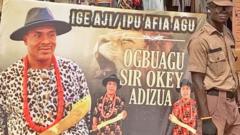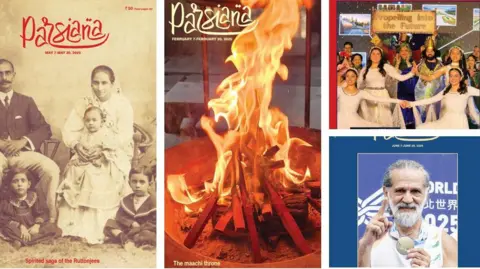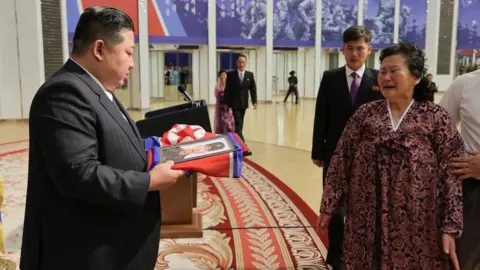In Oguta, a vibrant town in southeastern Nigeria, the ancient title of "Leopard Slayer" or "Ogbuagu" retains its significance, embodying pride, tradition, and community cohesion. This year, Ken Okoroafor, a 60-year-old businessman, fulfilled a lifelong dream by receiving this esteemed title, drawing joyous crowds eager to celebrate.
Historically, the act of hunting and slaying a leopard conferred societal prestige among men of the region. An individual aspiring to claim the title was required to hunt a leopard themselves and present it to the local king, with the meat then shared among 25 surrounding villages. However, as leopard populations dwindled due to conservation efforts, this practice transformed, allowing for financial contributions instead of actual hunts. The last leopard sacrifice was recorded in 1987, and today, financial acknowledgments maintain the spirit of this tradition.
Reflecting on his family's heritage, Mr. Okoroafor shared poignant memories of his mother's leopard-hunting legacy dating back to 1955. "That attracted me. It's something I've been hoping to join since I was a little boy," he expressed, emphasizing the respect garnered through Igbuu membership, which intertwines with decision-making in local affairs.
The practice of utilizing money dated back to 1942 when tradition first made way for adaptability in the face of dwindling wildlife. A new initiate, during his ceremonial progression, embarks on three elaborate stages, culminating in a grand feast observing cultural practices and serving traditional dishes.
The Igbuu Society, steeped in historical legacy and prestige, mandates exclusivity in its membership, requiring marital status, property ownership, and maintaining a reputable standing. Innovations in participation have forged connections for those in the global diaspora, drawing former local men back home to honor their roots.
Critical debates circulate about the societal impact of the Igbuu Society, with some calling for reforms to enable broader inclusion. Yet, society representatives argue that membership is based on personal achievements, contributing significantly to local development through their economic influence.
Ongoing changes are emerging within the society as officials engage in conversations about abolishing outdated systems that discriminate against the descendants of enslaved individuals. They are poised to join the ranks of the esteemed Ogbuagu, aiming for unity within the community.
Whether in Oguta or abroad, the connection to culture remains strong as members return home to celebrate their heritage. As new "Leopard Slayers" emerge, the dinners, dances, and camaraderie at their ceremonies are emblematic of a resilient society determined to adapt while preserving its core values.
Historically, the act of hunting and slaying a leopard conferred societal prestige among men of the region. An individual aspiring to claim the title was required to hunt a leopard themselves and present it to the local king, with the meat then shared among 25 surrounding villages. However, as leopard populations dwindled due to conservation efforts, this practice transformed, allowing for financial contributions instead of actual hunts. The last leopard sacrifice was recorded in 1987, and today, financial acknowledgments maintain the spirit of this tradition.
Reflecting on his family's heritage, Mr. Okoroafor shared poignant memories of his mother's leopard-hunting legacy dating back to 1955. "That attracted me. It's something I've been hoping to join since I was a little boy," he expressed, emphasizing the respect garnered through Igbuu membership, which intertwines with decision-making in local affairs.
The practice of utilizing money dated back to 1942 when tradition first made way for adaptability in the face of dwindling wildlife. A new initiate, during his ceremonial progression, embarks on three elaborate stages, culminating in a grand feast observing cultural practices and serving traditional dishes.
The Igbuu Society, steeped in historical legacy and prestige, mandates exclusivity in its membership, requiring marital status, property ownership, and maintaining a reputable standing. Innovations in participation have forged connections for those in the global diaspora, drawing former local men back home to honor their roots.
Critical debates circulate about the societal impact of the Igbuu Society, with some calling for reforms to enable broader inclusion. Yet, society representatives argue that membership is based on personal achievements, contributing significantly to local development through their economic influence.
Ongoing changes are emerging within the society as officials engage in conversations about abolishing outdated systems that discriminate against the descendants of enslaved individuals. They are poised to join the ranks of the esteemed Ogbuagu, aiming for unity within the community.
Whether in Oguta or abroad, the connection to culture remains strong as members return home to celebrate their heritage. As new "Leopard Slayers" emerge, the dinners, dances, and camaraderie at their ceremonies are emblematic of a resilient society determined to adapt while preserving its core values.






















